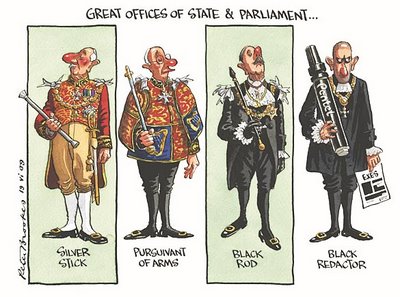The decision by the Times to "out" NightJack, and Justice Eady's corresponding ruling that bloggers have no right to anonymity must rank as one of the most short-sighted and potentially damaging to journalism episodes in quite some time.
Quite why the Times took it upon itself to discover the true identity of the winner of this year's Orwell prize for blogging is itself a mystery. Its justifications, such as they are, that he revealed details about cases and gave tips on how to evade justice, are pitiful. NightJack had done nothing to attract attention to himself other than presumably putting himself forward for the Orwell prize, and the fact that he could write to such an ability that he pulled in readers who admired his ability to analyse both his job, the politics surrounding it and the social problems which he had to deal with. NightJack had actually stopped blogging shortly before he won the Orwell prize, and had put his sights on writing a novel, rather than bringing out a book of the best of the blog, for which he had presumably had numerous offers. He didn't even turn up to receive the prize, as someone wanting to remain anonymous would never have done, and had also undoubtedly not economically benefited from his writing.
It would be tempting to put down the reason for the Times exposing Nightjack as simple jealousy that they didn't have a writer of such calibre prepared to put pen to paper for them, yet the Times has been one of the few newspapers that have given space to reasonably well-known bloggers to write original pieces for it. Likewise, the smug neo-con Oliver Kamm was taken on by the paper and is now one of its leader writers as a direct result of his stultifying blogging and obsession with attacking Noam Chomsky. Quite rightly, others have remembered how the Sunday Times treated the Girl With a One Track Mind, the sex blogger who was outed in a fashion which would have shamed the tabloids. It isn't an exact comparison, as Zoe Margolis had just published a book of her blog and didn't write about anything as high-minded as Nightjack, preferring to detail her tedious sex life in a pseudo-intellectual style, but it seems to have been a portent of what was to come.
The main reason though for why this is such an ill wind for journalism as a whole is the implications it has for whistleblowing, which if the Times had stopped to consider for a second it would have surely noted. Eady has in effect ruled that anyone in the public services who wants to bring attention to something which they think is a cause for concern, but which by doing so they would breach "discipline regulations" has no right to protection. Arguably, Nightjack was not performing such a public service in his writing, but this surely still has a potentially chilling effect for those who do. In fact, what this ruling seems to do is ensure that those who do want to whistleblow will have to go to publications like the Times for protection; if they do it themselves through blogging then newspapers have a justification for uncovering their true identity.
Newspapers concerned with the protection of their sources will be deeply worried by this ruling. If Nightjack has no right to privacy, then just who does? According to the Times' analysis, Eady based part of his decision on the previous ruling concerning George Galloway's exposure of Mazher Mahmood, a battle which this blog was involved in. Ironically, it was then the Times' sister publication which was fighting against their top reporter having his cover blown, but the two cases are surely completely different. Mahmood was a journalist who had ruined people's lives and had arguably been involved in entrapping individuals to develop his stories. When he himself failed to entrap Galloway in a similar fashion, he reacted to the publication of two grainy, unclear photographs in a ridiculous fashion, claiming it put his life in danger, something which was treated with short shrift. Mahmood was a hypocrite; Nightjack is not, and was not exposing anyone.
Just how potentially damaging this ruling could be is illustrated by the current battle going on in Northern Ireland, where the Sunday Tribune journalist Suzanne Breen has been defending herself against attempts by the police service of the province to obtain the identity of her sources, who informed her that the Real IRA had claimed responsibility for the murder of two soldiers outside Massereene barracks in Antrim in March. Unlike Mahmood, Breen's life almost certainly would be threatened should her source be revealed, yet that hasn't stopped the police from treating her life with such apparent contempt. Less seriously, this surely also threatens journalists who write under pseudonyms, something which the Times has again also overlooked; why should they be protected when bloggers aren't?
Furthermore, isn't the current situation in Iran, where those trying to let the world know what is happen are having to resort to Twatter further evidence of how dangerous this ruling is? According to Eady, those doing so are indulging in public activity where they have no right to anonymity, the kind of idea that would delight totalitarian regimes everywhere. Similarly, newspapers would be outraged were the government to do what the Times has just done, demanding that they reveal the source for sensitive articles, claiming it would be a threat to press freedom. It turns out that all the Times and News International care about is their own self-interest, which rather undermines their repeated past criticisms of Eady and the Human Rights Act for establishing a privacy law by stealth. It seems that celebrities are protected, while everyone else is fair game. The Times may yet come to regret their supreme selfishness and lack of dedication to protecting sources bitterly.Labels: anonymity, bloggocks, journalism, Mr Justice Eady, NightJack, privacy law, sources



